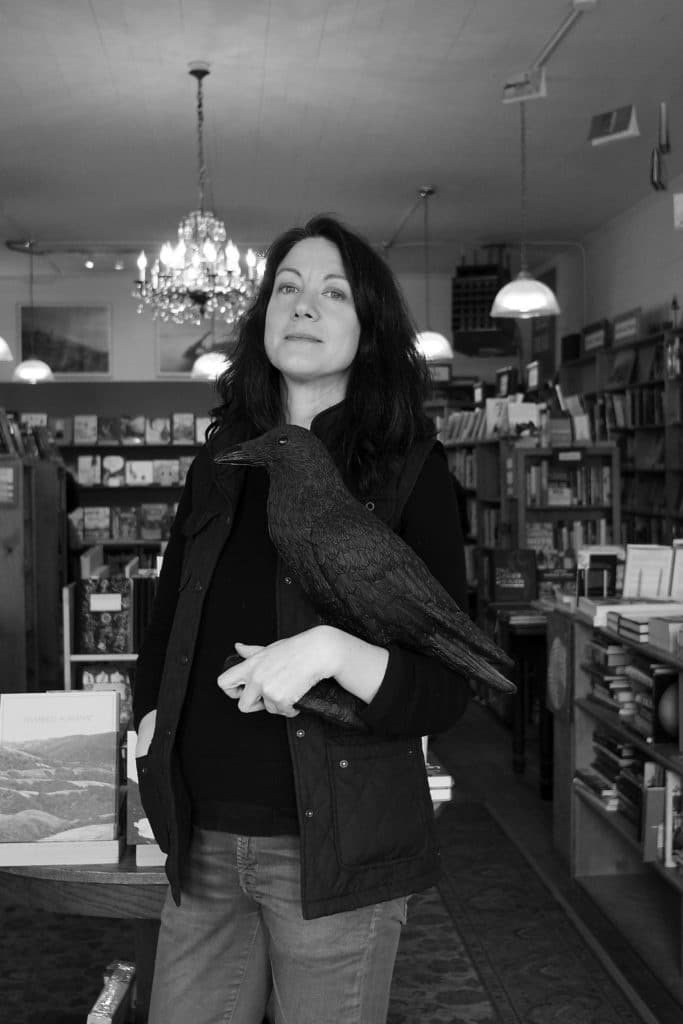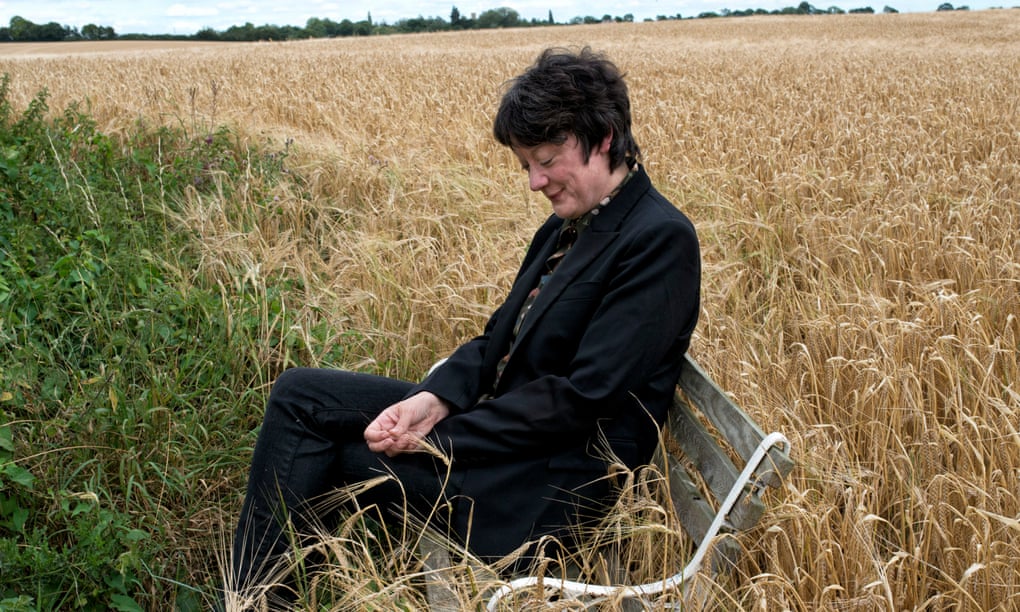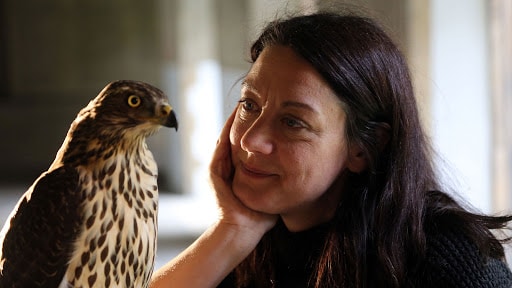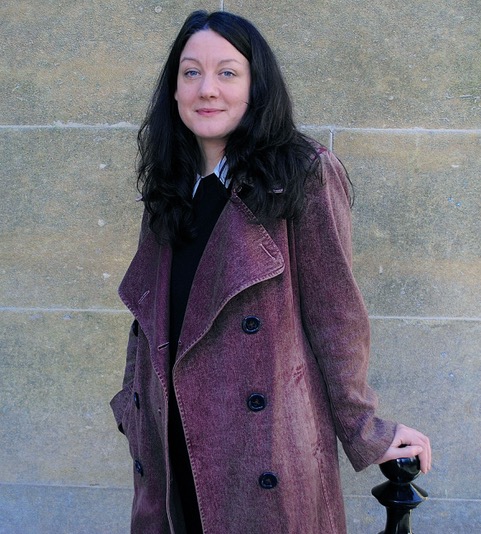
On October 13, Literary Arts will launch our 2020-21 season of Portland Arts & Lectures with Helen Macdonald: Writer, poet, illustrator, naturalist, research scholar, and author of the recent essay collection Vesper Flights and the best-selling memoir H Is for Hawk, which the New York Times notes reminds us that “excellent nature writing can lay bare some of the intimacies of the wild world.”

In this interview with Lisa Allardice in The Guardian, Macdonald talks about her recent, post-lockdown tattoo, the climate emergency, living alone in middle-age, and how grief and loss are integral parts of the emotional landscape of her books.
“Writing about love means you are also writing about death. Because love and death and loss are all part of one thing, really, particularly now with the climate emergency. It is really hard to write about the natural world without writing about grief.”

Want to be a nature writer like Macdonald? This article she wrote for Lit Hub, titled The Things I Tell Myself When I’m Writing About Nature, features advice from the maestro herself.
Her tips include: Don’t talk down to your readers, be specific, and recognize that sometimes what you think you’re writing about isn’t actually what you’re writing about.
“I learned to listen very carefully to what was going on between the lines, to always pay attention to what the words in front of you are really saying. It’s never too late to stop and start again.”

What’s on Macdonald’s bookshelf? In this Book Marks Questionnaire from Lit Hub, Macdonald shares some of her all-time favorite reads, and what’s been on her to-read list lately.
Her favorite book to give as a gift? Elena Passarello’s Animals Strike Curious Poses, which won the 2018 Oregon Book Award for Creative Nonfiction. Passarello will interview Macdonald as a part of the event on October 13th.
20-8042-0456-20_21-PAL_HelenMacdonald_program_FINAL-hi-res
Learn more about the event in the digital event program above.
Interested in more? Below is a bio of Macdonald’s life and writing career thus far.
Helen Macdonald was born in Surrey, in South East England, in 1970. Her father was the youngest staff photographer at the Daily Mirror, and her mother worked for local newspapers such as the Aldershot News. In 1975, her parents bought a home in Tekels Park, a private estate on land owned by the Theosophical Society. Growing up in Tekels Park “indelibly shaped” Macdonald’s writing life.
Living in Tekels Park turned her in to a “gothic naturalist child;” she spent hours wandering the grounds and observing the plants and animals. She liked to lay in the meadows or perch in a beech tree and read: “The more I read, the more I wanted to write, and I filled notebooks with everything from dreadful poetry to stories about the characters in the books I’d read.”
A lifelong scholar, her long affiliation with the University of Cambridge began with her undergraduate studies of English literature. She returned later for graduate studies in history and philosophy of science, and from 2004 to 2007 was a research fellow at Jesus College at Cambridge. She is currently an Affiliated Research Scholar at the Department of History and Philosophy of Science. She has also worked as a professional falconer, and assisted with the management of raptor research and conservation projects across Eurasia.
Simple Objects, Macdonald’s first book of poetry, was published in 1992, followed by Shaler’s Fish in 2001 (reissued in 2016) and Falcon in 2006. In 2014, she turned to prose, with H Is for Hawk. The book won the Samuel Johnson Prize for non-fiction (now the Baillie Gifford Prize), the Costa Book of the Year award, and was a finalist for the National Book Critics Circle Award for autobiography. It was one of the New York Times Book Review 10 Best Books of the Year, a Best Book of the Year at TIME, NPR, Washington Post, and many, many more.
H Is for Hawk combines memoir, nature writing, and literary biography as Macdonald chronicles her experience training a goshawk while grieving her father. Macdonald said of the hybrid form: “I felt that all of me was in one place. All those parts of me – the literary side, the more scientific side, the experiential stuff, all the bird stuff – all came together in one.”
Dwight Garner called H Is for Hawk “an instant classic of nature writing” in the New York Times, writing, “Helen Macdonald’s beautiful and nearly feral book, H Is for Hawk, reminds us that excellent nature writing can lay bare some of the intimacies of the wild world as well. Her book is so good that, at times, it hurt me to read it. It draws blood, in ways that seem curative.”
In August 2020, Macdonald published the essay collection Vesper Flights to immediate acclaim. Slate said of the book, “No one describes the natural world with greater power or beauty,” and the Wall Street Journal called it “Dazzling… Macdonald reminds us how marvelously unfamiliar much of the nonhuman world remains to us, even as we continue to diminish it.”
In an interview about Vesper Flights, considering her frequent subjects of wildness and grief, Macdonald told the Guardian, “I really like to think my subject is love. Love of the world and the things in it…” But, she continues, “love and death and loss are all part of one thing, really, particularly now with the climate emergency. It is really hard to write about the natural world without writing about grief.”
Macdonald writes often for the New York Times Magazine. She lives in a cottage in the village of Hawkedon, in Suffolk county, near Cambridge. She has been weathering lockdown this year in the company of her green-cheeked conure (a small parrot), Birdoole, and recently got her first tattoo, a seraph inspired by a nineteenth-century screen in St. Peter’s Church, Ely.
“We don’t need to strike out into the wild to feel close to the natural world and receive benison from it. From one place, we can witness the sweep and dip of the universe about us. The stars over the monastery gables, the birds on the wire, the street pigeons that visit the patch of grass behind my house before flying off elsewhere. We can become deeply connected to the world through paying the most careful and fearless attention to what we can see, from wherever it is we must be.”
Macdonald, on taking comfort in observing nature during the Coronavirus pandemic, from The New York Times


